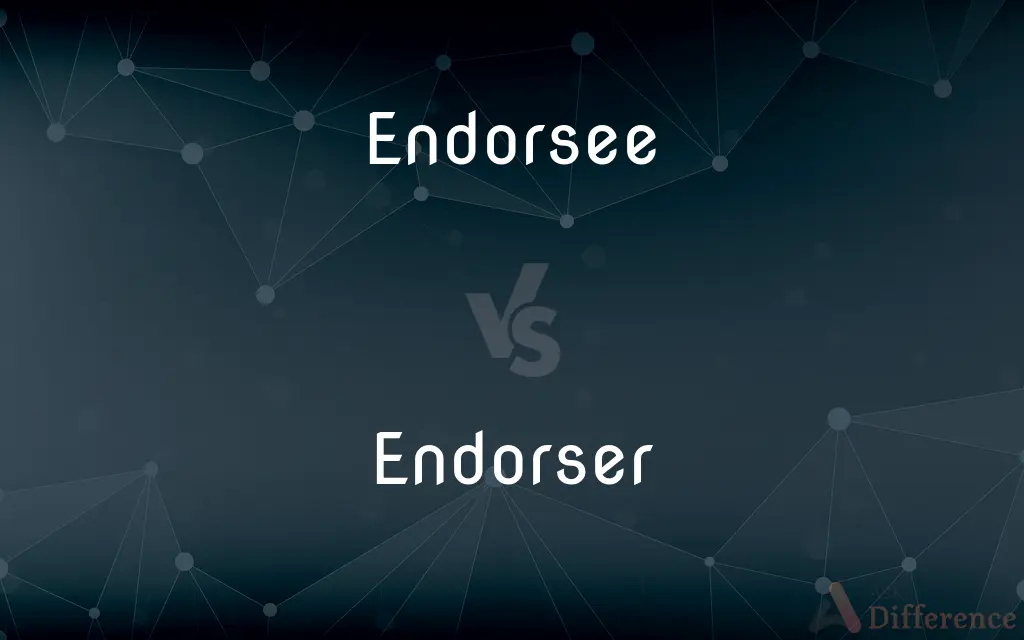Endorsee vs. Endorser — What's the Difference?
By Maham Liaqat & Urooj Arif — Updated on April 4, 2024
An endorsee is the recipient of an endorsement, often benefitting from the support or approval, whereas an endorser is the one who provides this endorsement, typically having authority or influence.

Difference Between Endorsee and Endorser
Table of Contents
ADVERTISEMENT
Key Differences
An endorsee is the party receiving an endorsement, which could be a person, organization, or product, benefiting from the credibility or support of the endorser. On the other hand, an endorser is an individual or entity that provides the endorsement, leveraging their credibility or popularity to support the endorsee. This dynamic is crucial in marketing, where the reputation of the endorser can significantly impact the perceived value of the endorsee.
In terms of responsibility, the endorsee typically has the role of maintaining or enhancing the value they gain from the endorsement, such as upholding a positive image or meeting certain standards. Conversely, the endorser must choose whom or what to support carefully, as their reputation can be affected by the performance or behavior of the endorsee.
From a legal perspective, endorsers may be held liable for statements they make about a product or service, particularly if those statements are misleading or false. Endorsees, while benefiting from the endorsement, also face legal obligations to ensure they do not misrepresent the endorsement or engage in deceptive practices.
In financial contexts, the relationship between an endorsee and an endorser can involve contractual agreements, where endorsers are often compensated for their endorsement. The endorsee, in turn, may gain increased sales, visibility, or credibility, illustrating the mutual benefits of the relationship.
The success of the endorsement relationship depends on the compatibility between the endorser’s image and the values or qualities of the endorsee. This alignment is essential for the endorsement to resonate with the target audience, making the selection process critical for both parties.
ADVERTISEMENT
Comparison Chart
Definition
Receives endorsement
Provides endorsement
Role
Beneficiary of the endorsement
Originator of the endorsement
Responsibility
Maintain value of endorsement
Carefully select endorsements
Legal Implications
Must not misrepresent the endorsement
May be liable for misleading statements
Financial Aspect
May gain increased sales or credibility
Often compensated for providing endorsement
Compare with Definitions
Endorsee
The beneficiary in a sponsorship deal.
The team became the official endorsee of the sports drink.
Endorser
An individual or organization that supports someone or something.
She was a prominent endorser of the health initiative.
Endorsee
A person or entity that is supported by another’s endorsement.
As an endorsee of the brand, she appeared in several advertisements.
Endorser
A professional who recommends a particular service.
The doctor became an endorser for the medical equipment.
Endorsee
A product receiving official backing.
The new line of sneakers was the endorsee of a famous athlete.
Endorser
An entity that backs a political candidate.
The organization was a key endorser in the election campaign.
Endorsee
The recipient of public or professional endorsement.
He was the endorsee for a renowned award in his field.
Endorser
A celebrity who promotes products or brands.
The actor was a well-paid endorser for the luxury car brand.
Endorsee
A party endorsed in a political context.
The candidate was an endorsee of a major political figure.
Endorser
A person who signs a document in support of another.
He was the endorser on the recommendation letter.
Endorsee
One to whom the rights available under an instrument, such as a land title, have been transferred by endorsement.
Endorser
To express approval of or give support to, especially by public statement; sanction
Endorse a change in policy.
Endorse a political candidate.
Endorsee
The person to whom something is transferred by endorsement.
Endorser
To recommend (a product), often in exchange for payment, as in an advertisement.
Endorsee
Same as Indorsee.
Endorser
To write one's signature on the back of (a check) to obtain the amount payable or to make the amount payable available to a third party or to the bearer.
Endorser
To write one's signature on the back of (an instrument) to transfer the rights available under that instrument to another party.
Endorser
To place (one's signature), as on a contract, to indicate approval of its contents or terms.
Endorser
To acknowledge (receipt of payment) by signing a bill, draft, or other instrument.
Endorser
A person who endorses
Endorser
Same as Indorser.
Endorser
Someone who expresses strong approval
Endorser
A person who transfers his ownership interest in something by signing a check or negotiable security
Common Curiosities
What is an endorsee?
An endorsee is a person, product, or organization that receives an endorsement.
Can an endorsee also be an endorser?
Yes, an individual or entity can be both an endorsee and an endorser in different contexts.
What are the benefits for an endorsee?
Benefits include increased visibility, credibility, and potentially sales or support.
What responsibilities does an endorser have?
An endorser has the responsibility to choose their endorsements wisely and may be liable for misleading endorsements.
What does an endorser do?
An endorser provides support or approval, often to promote or validate the endorsee.
What role do contracts play in endorsement deals?
Contracts outline the terms, responsibilities, and compensation in endorsement deals, providing legal protection for both parties.
What makes a successful endorsement?
A successful endorsement aligns the endorser’s image with the endorsee’s values or qualities, resonating with the target audience.
How are endorsers compensated?
Endorsers are often compensated with money, products, or services in exchange for their endorsement.
What legal implications exist for endorsers?
Endorsers can face legal consequences if their endorsements are misleading or false.
Can anyone be an endorser?
While anyone can endorse something, effective endorsers typically have credibility, popularity, or authority.
What happens if an endorsement fails?
A failed endorsement can damage the reputations of both the endorsee and the endorser and may have financial repercussions.
Can endorsements impact consumer behavior?
Yes, endorsements can significantly influence consumer perceptions and buying decisions.
How important is the selection of an endorser?
The selection of an endorser is crucial, as their credibility directly influences the effectiveness of the endorsement.
Are there ethical considerations in endorsements?
Yes, ethical considerations include honesty, transparency, and the potential impact on consumers and society.
How do endorsements vary across industries?
The nature and impact of endorsements can vary greatly, depending on industry norms, audience expectations, and the products or services involved.
Share Your Discovery

Previous Comparison
Pit vs. Sump
Next Comparison
Devoted vs. DevoutAuthor Spotlight
Written by
Maham LiaqatCo-written by
Urooj ArifUrooj is a skilled content writer at Ask Difference, known for her exceptional ability to simplify complex topics into engaging and informative content. With a passion for research and a flair for clear, concise writing, she consistently delivers articles that resonate with our diverse audience.
















































